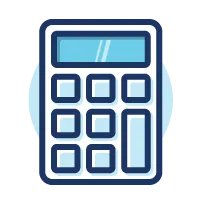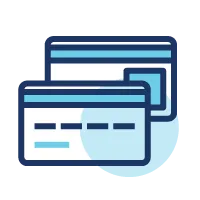Key Takeaways
- Personal loans provide flexibility. They offer a lump sum with fixed repayment terms, which make them great for large expenses like debt consolidation, home improvements or unexpected costs.
- Personal loans may come with higher interest rates or fees, especially for borrowers with lower credit scores.
- Personal loans are best used for specific, planned expenses or emergencies.
Personal loans can be a useful financial tool when you need extra funds for a big life moments or if an unexpected expense comes up. Whether you're consolidating debt, financing a home renovation, or covering emergency costs, understanding how personal loans work can help you decide if it’s the right financial move for you.
In this guide, we’ll break down what a personal loan is, how it can be used, and when it makes the most sense to borrow. We'll also explore the pros and cons to help you decide if a personal loan is the right choice for your financial situation.
What is a Personal Loan?
A personal loan is an unsecured loan that individuals can borrow from financial institutions for personal use. Unlike mortgages or auto loans, personal loans don't require collateral, which means the lender relies on your creditworthiness and ability to repay. With fixed repayment terms and interest rates, personal loans offer flexibility in how you use the borrowed funds.
How do Personal Loans Work?
When you take out a personal loan, you receive a lump sum of money upfront. You’ll then pay back the funds in monthly installments over a predetermined period, typically between one to five years.
Interest is charged on the amount borrowed, and the rate can either be fixed or variable depending on the lender. Your monthly payments cover both the loan principal and interest. Like with any loan, missing payments could harm your credit score or incur additional fees.
How to Take Out a Personal Loan
When considering applying for a personal loan, start by checking your credit score. Lenders look at your credit score to assess your ability to repay. A higher score typically results in better interest rates.
When seeing what financial institutions offer, pay attention to loan terms, fees, and interest rates. At OneAZ, we offer loan prequalification, which allows you to see potential loan terms without impacting your credit score.
Once you’re ready to apply, here’s what the process looks like:
- Apply for the loan: Submit a formal application. You’ll likely need to provide proof of income, employment and other personal details.
- Receive funds: After you’ve been approved, you’ll receive the loan amount in your account. This usually happens within a few days.
- Repay the loan: Make monthly payments over the term of the loan. Setting up automatic payments can help ensure you never miss a payment.
Reach Your Goals with the New OneAZ Personal Loan.

With a higher borrowing limit, more flexible terms, and FREE financial coaching session, our revamped Personal Loan makes you unstoppable.
When It Makes Sense to Use a Personal Loan
A personal loan makes sense if you need a large amount of money upfront for an important purchase or expense and you’re confident you can make the monthly payments. It's also a smart option if you’re consolidating high-interest debt or dealing with unexpected expenses and don’t want to tap into your emergency savings.
When Not to Use a Personal Loan
However, a personal loan might not make sense for small expenses or if you already have difficulty managing your debt. Evaluate your financial situation and loan terms carefully to determine if a personal loan is the right fit for your needs.
Here are a few examples of what you might use a personal loan for:
- Wedding expenses: Many people use personal loans to cover the cost of weddings, including venue rentals, catering, and other wedding-related expenses.
- Starting a business: While business loans are often preferred, personal loans can help get your small business off the ground, especially if you’re just starting.
- Vacations: If you’re planning a big trip or a once-in-a-lifetime vacation, a personal loan can help finance it without straining your budget.
Personal Loan Pros and Cons
Personal loans can be beneficial, but they also come with potential drawbacks.
Benefits of a Personal Loan
Approaching your parent with the news they’ve been scammed requires sensitivity and care:
- Flexibility: Personal loans can be used for a wide range of purposes, from consolidating debt to funding home improvements, medical expenses, or major purchases. This versatility makes them a convenient option.
- No collateral required: Most personal loans are unsecured, meaning you don't need to offer up assets (like your home or car) as collateral, reducing the risk of losing valuable property if you can't make payments.
- Fixed interest rates and payments: Many personal loans offer fixed interest rates and monthly payments, which can help you manage your budget by providing predictable payment amounts over the loan term.
- Lower interest rates than credit cards: For borrowers with good credit, personal loans often come with lower interest rates than credit cards, making them a cost-effective option for consolidating high-interest debt.
- Quick access to funds: Personal loans are typically disbursed quickly after approval, providing access to the funds you need within days. This is ideal for emergencies or time-sensitive projects.
- Builds credit: Making on-time payments on a personal loan can help improve your credit score, which may help you secure better rates on future loans or credit lines.
Disadvantages of a Personal Loan
Once the initial conversation is over, support your parent through the next steps:
- High interest rates: If your credit score is low, you may end up with higher interest rates, making the loan more expensive in the long run.
- Fees: Some lenders charge origination fees, prepayment penalties, or late payment fees, which can increase the total cost of the loan.
- Impact on credit: Missing payments can negatively impact your credit score, making it harder to borrow in the future.
- Fixed monthly payments: Unlike credit cards, personal loans require fixed payments, so there's less flexibility if your financial situation changes.
Personal Loan Frequently Asked Questions
- Can I use a personal loan for anything?
- While personal loans offer flexibility, there are some restrictions. You can’t typically use them for illegal activities, gambling, or investing in high-risk assets. Lenders may also restrict their use for college tuition, though student loans are a better option in that case. Always read the fine print on how the lender allows the loan to be used before applying.
- How do I make the most out of a personal loan?
- To get the most out of a personal loan, follow these tips:
- Borrow only what you need: Over-borrowing can lead to unnecessary interest payments. Be mindful of the total amount required to meet your financial goal.
- Make payments on time: Timely payments help build your credit score and prevent penalties or additional fees.
- Pay off the loan early: If you can, try to pay off your loan early to save on interest.
- What do you need to get a personal loan?
- To get a personal loan, you’ll typically need the following:
- Good credit score: Most lenders require a credit score in the fair to excellent range (typically 600 or above). A higher score can help you qualify for better terms and lower interest rates.
- Proof of income: Lenders need to ensure you can repay the loan, so they’ll ask for proof of income, such as recent pay stubs, tax returns, or bank statements. Self-employed applicants may need to provide additional documentation.
- Debt-to-income ratio: Lenders will assess your debt-to-income (DTI) ratio to ensure you’re not overburdened with debt. Ideally, your DTI should be below 40%.
- Personal identification: You’ll need to provide proof of identity, such as a government-issued ID (driver’s license, passport) and your Social Security number.
- Proof of residency: A utility bill, lease agreement, or other document showing your current address should suffice.
- Employer information: You may need to provide information about your employer and how long you’ve been employed.
- Bank account information: For disbursing the funds, the lender will need your bank account details. This is also needed if you set up automatic payments for loan repayment.
APR = Annual Percentage Rate













